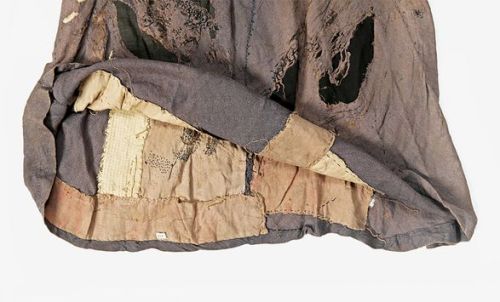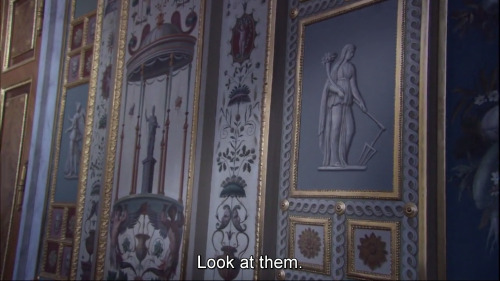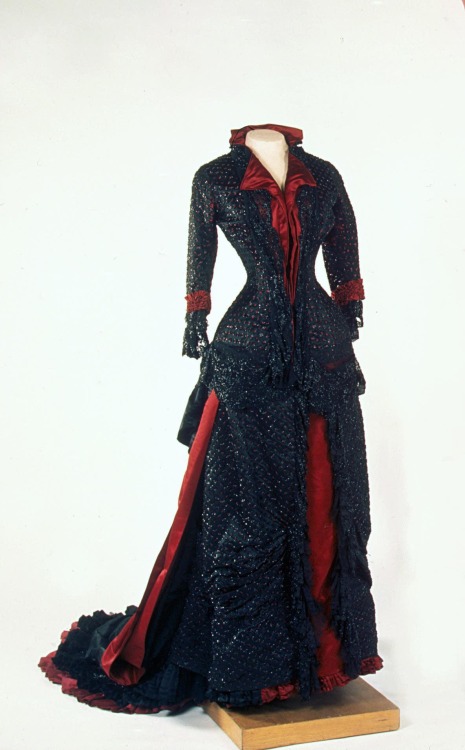#russian history
At my internship I have to open a lot of dead people’s mail. These stamps were sent to Adlai E. Stevenson’s secretary from a friend traveling around Russia in 1958. (click to make the pictures larger)
Post link
One of the last photos of Dowager Empress Maria Feodorovna (spouse of Alexander III, mother of Nicholas II) [1924] The photo was taken close to the Russian Orthodox Church of Alexander Nevsky in Copenhagen, Denmark. Assisting her is Cossack Timophey Yaschik. Yaschik was the Dowager Empress’s bodyguard and stayed with her from 1912 until her death in 1928. [source]
Post link

HIM Nicholas II of Russia visits in military attire wounded hospitalized soldiers during the Great War. The Imperial Russian family actively contributed the war and relief efforts.
Valentina Bukhanevich-Antonova’s summer dress, 1938/39
Antonova (1907-1993) was wearing this dress when she was arrested, and continued to wear it continuously for an entire year during her stay in three Moscow prisons. She was part of the “Great Purge” of the Stalinist era, during which millions of people, particularly political party members, were arrested for arbitrary reasons, such as being part of an opposition or nationalist group, or even sustaining brief contact with someone who had already been denounced and arrested.
Antonova’s dress shows extreme wear, but also an effort to maintain a sense of decency in her horrific surroundings. The hem and sleeves, for instance, show many attempts at patching up holes and tears, undoubtedly done on the sly. Antonova was ultimately not convicted, and released in 1939 [x].
Post link
Anti-Religion Campaigns in the Soviet Union
Karl Max called religion “the opiate of the masses,” and Soviet leaders in the 1920s and 30s took his words to heart, as these propaganda posters show. Religion was touted as a backwards institution that had no place in a Soviet Republic that strove for scientific advancement and industrialization. The Bolsheviks focused their attentions on the Orthodox Church in particular, for two reasons: it was the dominant religious body of the Tsarist era, and its use of glittering churches and artifacts gave it a bourgeois air; meanwhile, its hierarchical body of power made it a threat to the authority of the Soviet regime. Starting in 1920, churches across Russia were closed and repurposed as secular buildings, particularly for educational purposes.
Post link
The nuclear-powered lighthouse of Cape Aniva in Russia was built in 1939 and was originally supposed to be maintained by a group of people. Later, because of the stormy local sea waters and the distant location, the Soviet government decided to make it completely automatic, putting a specially designed nuclear power unit in the lighthouse tower. This day this unique building is abandoned as its reconstruction is being constantly delayed because of the risk of the radioactive pollution around the area. Read more
Post link
9 July 1790

Perhaps the greatest Swedish naval victory in their history occurred when they defeated the Russian fleet at the Second Battle of Svensksund, on this day in history, 9 July 1790. The severity of the Russian defeat (7,400 casualties and 19/20 frigates lost) forced them into negotiations which resulted in the end of the Russo-Swedish War of 1788–90.
1840-1841 Christina Robertson - Empress Alexandra Feodorovna (Charlotte of Prussia)
(State Hermitage Museum)
Post link
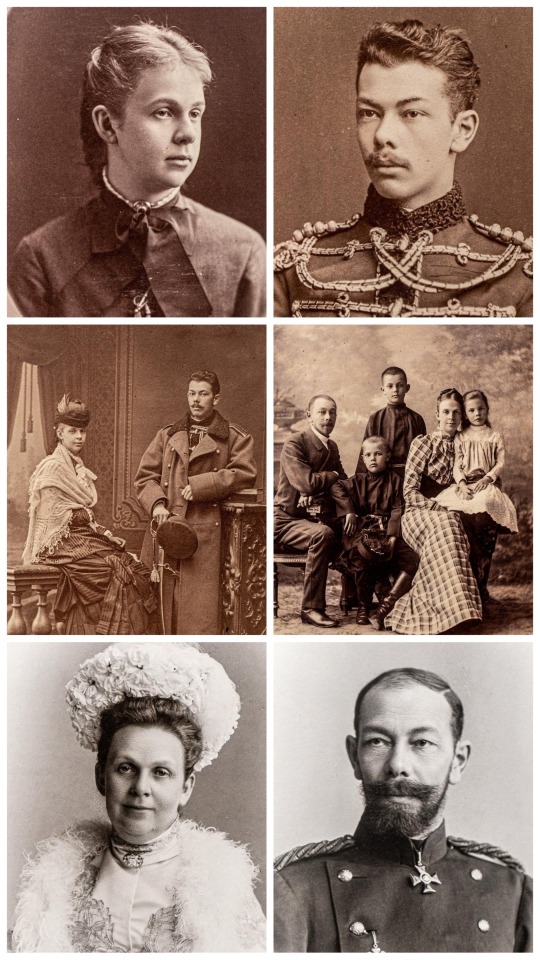
The Golitsyn family: princess Sofya Alexandrovna, prince Alexander Borisovich and their children.

The Golitsyn family: princess Sofya Alexandrovna, prince Alexander Borisovich and their children.

Princess Golitsyna Sofya Alexandrovna in a Russian court dress

Tilsit date. Napoleon, Alexander I, Louise and Frederick William III of Prussia’ by Nikolas Gosse, 1807

“I feel like I’m entering the Fatherland,” Charlotte told the mourners as her carriage crossed the Russian border. The Cossack convoy that met her burst out “Hurrah!”, the princess told them in Russian: “Thank you, guys.” Then she turned to the Cossack colonel: “Please order them to shout again, I like it…” She sought to speak Russian with those courtiers who did not know foreign languages. However, despite the fact that her teacher was the poet Vasily Zhukovsky, Charlotte did not learn Russian until the end of her life.


«She never left the children brought up in her institutions afterwards, but helped them all her life, went into all the details that concerned them, and was a true mother to everyone. None of those who served her died in the palace except in her presence. She comforted everyone to the end and always closed the eyes of the dying. Doctors once told her that her retired lady-in-waiting, who lived on Vasilievsky Island, was suffering greatly from breast cancer, that it would be possible to save her, but she did not agree to the operation otherwise than if the Empress herself would be present during her production. “Well,” she said, “if only her recovery depends on it, then I will fulfill her wish.” She went to her and held her head during the whole operation.
She went into the smallest details about her establishments and not only supervised the upbringing of the children, but also did not forget to send them treats and give them all sorts of pleasures. One boy was forced to stay in bed for a long time due to illness; she brought him drawings, pencils and various things. With every courier she was informed about the state of his health — she was in Moscow at the time. When appointing honorary guardians, the choice was the strictest: she corresponded with each of them herself weekly, inquired about the pupils and pupils, about their behavior and health, and always gave wise humane advice … Everything was invented by a tender heart for the benefit, joy and peace of all who depend on her. It was not a dry, lifeless patronage, but maternal care. But her arrival at the institute was a real holiday. Maman, mam an, Mutterchen — could be heard from everywhere. Sometimes, at a big dinner, she would order dessert to be taken off and sent to some institute in turn. And she asked guardiansin her testament to remember that the first basis of all actions should be a boon!Babies abandoned by their mothers enjoyed her special attention. One day my father, who always accompanied her when she visited institutions, expressed surprise that she so tenderly kissed the little members of these unfortunate people, examined the laundry on the nurses and so on. “Ah!” she replied, “all these abandoned children are now mine and must find in me the care they are deprived of."»
(с) Maria Sergeevna Mukhanova, lady-in-waiting of Empress Elizabeth Alexeievna.

Princess Eupraxia of Ryazan
A princess-consort of Ryazan by marriage to Prince Feodor Yurevich of Ryazan. She was venerated as a local saint in the Russian Orthodox church. She committed suicide rather than to surrender to captivity of Batu Khan during the Mongol invasion of Russia.
«In the year 6745 (1237), the blessed Prince Feodor Yurievich of Ryazan was killed by the godless Tsar Batu on the Voronezh River. And the blessed Princess Eupraxia, when she heard about the murder of her master, the blessed Prince Fyodor Yuryevich, immediately threw herself with her son, Prince Ivan Fedorovich, from the top of her palace and died…»
© The Tale of the Destruction of Ryazan. Unknown edition.
«In the year 6745 (1237), the blessed Prince Feodor Yurievich of Ryazan was killed by the godless Khan Batu on the Voronezh River. And hearing this, the blessed Princess Eupraxia, the princess of her murdered master, threw herself from the top of the church together with her son Prince Ivan Feodorovich and died…»
© The Tale of the Destruction of Ryazan. Main edition «A».
«… And Prince Feodor Yurievich with gifts met Batu Khan on the Voronezh River and begged him not to destroy the Ryazan land. Batu Khan was addicted to flattery and merciless, so he accepted his gifts and promised not to destroy the Ryazan land. He began to entertain the Ryazan guests with various amusements and asked them for their daughters and sisters to make them his concubines. And one of the Ryazan nobles, leading by the devil, told Batu Khan that the Ryazan prince has a wife of the royal family with a beautiful body and a white face. The godless Batu Khan, being crafty and merciless in his unbelief. Leading by his lust, he said to Prince Feodor Yuryevich: «Let me, Prince, see the beauty of your wife (to have a night with her)». The venerable Prince Feodor laughed and replied to him: «It’s not good for us, christians, to give our wives to you for fornication. Only by killing us you can have them». Batu Khan became enraged and upset. He ordered to kill the blessed Prince Feodor Yuryevich and give his body to animals and birds to be torn to pieces. This way he killed a lot of other Feodor’s people too.
But one of the grandees of Prince Feodor Yuryevich, named Aponitsa, found the body of his prince and buried him. After that, he visited the blessed Princess Eupraxia and told her how the wicked Batu Khan had killed the blessed Prince Fyodor Yuryevich. The blessed Princess Eupraxia, who was standing at the church and holding her dear child Ivan Feodorovich Postnik, heard these deadly words and bitterly threw herself from the top of the church with her son, and died…»
The Tale of the Destruction of Ryazan. Main edition «B», second kind.
«… She heard these words, standing in the church of St. Nicholas, and her heart was confused. It was filled with strong fear and sadness, and then she threw herself from the top of the church together with her son Ivan, and died…»
The Tale of the Destruction of Ryazan. Common edition.
«… After 12 years of transferring the miraculous icon to Ryazan, the godless Batu Khan came to the Russian land in the year 6745 (1237). And he killed Prince Feodor Yuryevich of Ryazan. His Princess Eupraxia, along with her son Ivan, climbed to the top of the church, where the icon of St. Nicholas was kept, and threw herself down from it, crashing to death. That ’s why the icon of St. Nicholas was called icon of Nikola Zarazsky…»
The Tale of the Destruction of Ryazan. Church calendar edition.
«… And a certain slave of one of the courtiers of Prince Feodor Yurievich with the name Opanitsa, looked at the body of his sovereign, blessed Prince Feodor, and wept bitterly: «Oh, my dear prince, how soon did you leave this world and left your reign, your power and your princess with children by refusing to obey the godless king and disobeying his will. You have suffered for your fatherland and for all your people, like no one else.» He having wept a lot and then buried him in that place. And soon he brought the news to the blessed Princess Eupraxia, telling her how «the wicked Batu Khan killed your blessed husband, Prince Feodore Yurievich.» The blessed Princess Eupraxia, standing at the top of her church and holding her dear child Prince Ivan Feodorovich on her hand, heard these deadly words about her husband, and was filled with great sorrows and sadness. And she said to her son: «O my dear, my poor child, Prince Ivan, the punishment for our sin has come to us from God, he has sent these filthy Ishmaelites against us. They want to ruin and capture us to the end, and they killed my sovereign, my husband, your father. The godless khan also wants to take me and enslave you to convert you to the Muslim faith. And it is better for us to accept death than to be abused in the hands of the filthy». And at that hour she threw herself from the top of the church and died..»
The Tale of the Destruction of Ryazan. Streltsy edition.






Princess Zinaida Ivanovna Yusupova, neeNaryshkina
« … the names of Countess Zavadovskaya, Ficquelmont, lady-in-waiting Princess Urusova and the young Naryshkina, later Princess Yusupova, were heard on everyone’s lips. All of them were written beauties, all of them were stars of the first magnitude of the St. Petersburg high society …»
© Count V.A. Sollogub
«Tall, thin, with a charming waist, with a completely sculpted head, she has beautiful black eyes, a very lively face with a cheerful expression that suits her so wonderfully…»
© Countess Dorothea «Dolly» Ficquelmont
«When I left Moscow, I hoped to be happy soon, linking my life with the life of Zeneida. But Maman, against whose will I would never dare to go, asked me to postpone the wedding. My chagrin was so great because of this delay that I almost fell ill.»
© Prince Boris Nikolaevich Yusupov, first husband of Zinaida.
«No less noticeable is the excessively prolonged and all-consuming flirtation of the charming Princess Yusupova with Gervais, an officer of the Chevalier Guard Regiment. She is of universal interest, because she is young in spirit, as well as in years, cheerful, naive, innocent. With amazing simplicity, she surrendered herself to the power of her feelings. It’s as if she doesn’t see the trap set in front of her and behaves at balls as if they are the only two in the whole world with Gervais…»
© Countess Dolly Ficquelmont
«My great-grandmother was a written beauty, lived merrily, had more than one adventure…
Even though she was an old woman, she remained a beauty and maintained a regal manner and posture. She was sitting rouged, perfumed, in a red wig and a bunch of pearl beads…»
© Felix Yusupov, great-grandson of Princess Zinaida Yusupova.


«Весёлая царица была Елисавет, поет и веселится, порядка только нет…»
«A cheerful tsarina Yelisaveta was, she sing and having fun, but there is no order…»
From the poem of Count Aleksey Konstantinovich Tolstoy.


«Princess Louise…she combined inexpressible charm and grace with restraint and tact, quite rare at the age of fourteen. In all her actions, the result of her mother’s worries, both respected and beloved, was visible. Her mind, soft and delicate, grasped with extreme rapidity everything that could decorate it, like a bee that knows how to get honey from the most poisonous plants. Her conversation reflected the freshness of her youth, and to this she added a great correctness of concepts.»
© Countess Varvara Nikolaevna Golovina about princess Louise of Baden, future Russian Empress Elizabeth Alexeievna.






«The Empress with the medical staff went around the wounded, provided first aid, tried in every possible way to ease the sufferings of the sick, despite the fact that she herself had a damaged arm above the elbow and she wore just a dress. An officer’s greatcoat was thrown over the shoulders of the tsarina, in which she walked along the crashed train…»
A. Myasnikov about Empress Maria Feodorovna on the day of the tragedy at the Borki station.
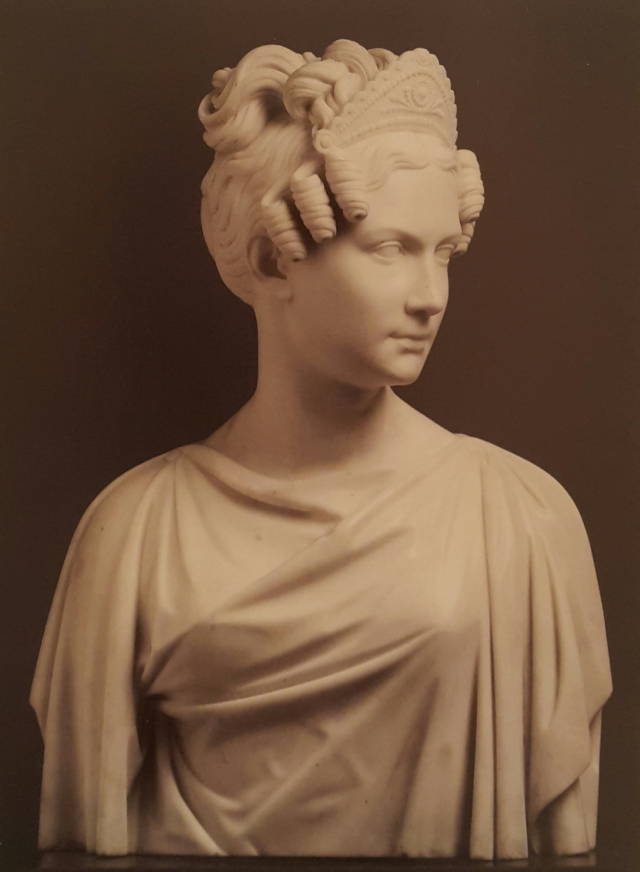
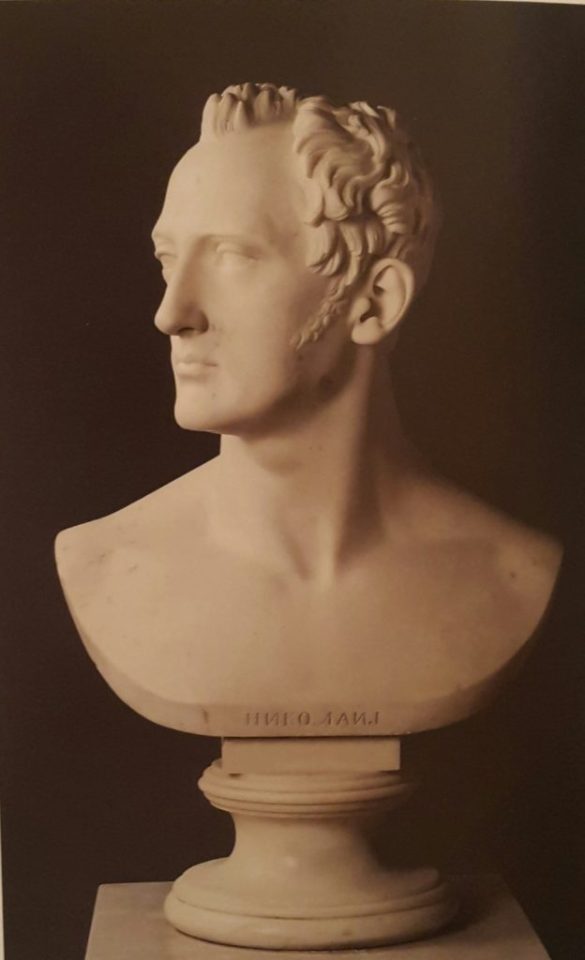
Busts of Emperor Nicholas I of Russia and Empress Alexandra Feodorovna


The oldest known Russian love letter.
This remarkable document was found in the form of two scraps that were found on the pavement. An addressee, having no fire or knife nearby, tore up and threw away the latter. But he didn’t just scatter these pieces, he tied them in a knot and only then threw them on the pavement.
[…] [I sent (?)] to you three times. What kind of grudge you owe to me, that you haven’t come to me this Sunday (week)? I have treated you like a brother! Did I hurt you by sending … [you messages]. As I can see, you don’t like it. If you like it, you would tear yourself away from the eyes (of others) and come running (to me) […].
[…] now somewhere else. Write to me about […] leave you? (Do you want me to leave you?/I won’t leave you or something like that). And even if I’ve hurt you with my foolishness, if you will laugh at me, God will judge (you) and I will.
Birch bark manuscript №752, Novgorod, 1100-1125.


Grand Duke Nicholas Mikhailovich of Russia to Maria Feodorovna, «Various facts from November 12 to November 19, 1916»
Count Gudovich told me that his niece, the little Countess Hendrikova, told him that two ladies, i.e., A.F. (Alexandra Feodorovna) and Anya (Anna Vyrubova), had notebooks where the names of people of all classes were written alphabetically, and that in these notebooks they usually looked for people fit to be ministers. Admit that this is pure madness. There is only one remedy, Sandro and Pavel do not mind, it is for the closest, for you and your children to take the initiative to conduct a medical consultation of all our celebrities from a medical point of view, and then send them to a remote sanatorium, with or without Vyrubova, to undergo serious treatment. Otherwise, be prepared for any accidents. Tell that to Sandro-because that’s my firm opinion.
Grand Duke Nicholas Mikhailovich of Russia to Maria Feodorovna, «Various facts from December 17 to December 22, 1916»
The balding man writing to you has been thinking a lot, spending sleepless nights, running around the empty St. Petersburg embankments at dawn — and now he tells you — never look for the names of the brave souls who performed this act of civic courage, high patriotism and deliverance*. The word is silver, and silence is gold!
Madame (Alexandra Feodorovna) is madder than ever. On the night of the 19th, after the autopsy of the corpse, the order came to transport… the body of the insignificant to the emperor’s palace!!!
Two more appointments to positions took place under the influence of the murdered man …
Madame is getting more and more in charge of drowning Nicky… And time passes, gossip intensifies, the general situation inspires fears.
I’m putting the same dilemma before you again. After the hypnotist, it is necessary to try to neutralize A.F., while she is hypnotized. By all means, it is necessary to send her as far away as possible, either to a sanatorium or to a monastery. We are talking about saving the throne - not the dynasty, which is still strong, but the present sovereign. Otherwise it will be too late. … All Russia knows that the late Rasputin and A.F. are the same. If the first one is killed, the second one should disappear. The general peace of mind depends on it. …
*about Rasputin’s murder


«Oh, they (OTMA) were lovely, and terribly sweet, far more beautiful than their photographs show. I was crackers about Marie, and was determined to marry her. She was absolutely lovely. I keep her photograph in my bedroom- always have.»
Mountbatten: Hero of Our Time by Richard Hough.




«She (Maria) was strikingly similar to her father, and her gaze resembled his scary gaze. The daughter bravely endured her father’s gaze. He turned pale, his cheeks trembled, and his eyes became even fiercer, his daughter answered him with the same look. Everything turned pale and trembled around, the ladies-in-waiting and the generals did not dare to breathe from this cannibal duel with their eyes… Nicholas got up, he felt that he has met his match.»
My Past and Thoughts by Alexander Herzen


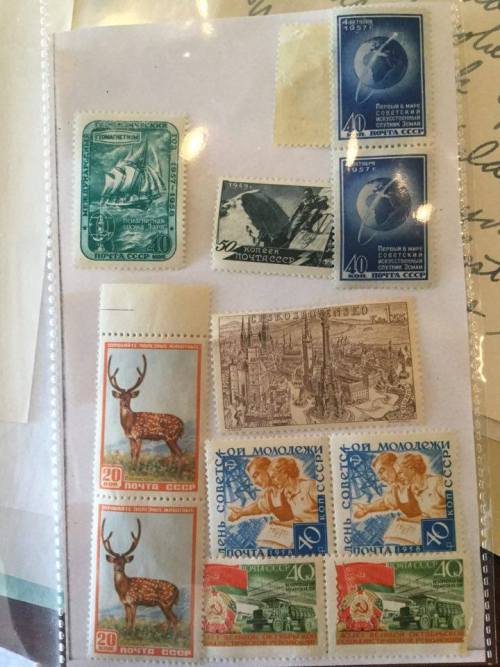






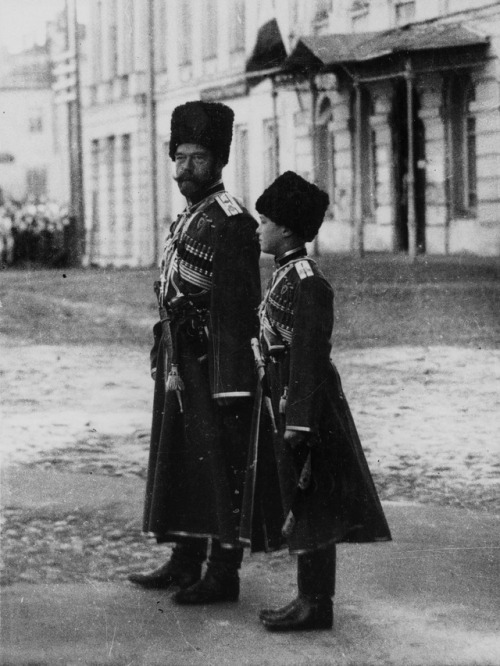
![Nicholas II with family, staff and officers, c. 1905. [original source] Nicholas II with family, staff and officers, c. 1905. [original source]](https://64.media.tumblr.com/a55b2dbbf9042bfe6ea49878cc2bb4ce/tumblr_pfkqryAFLB1skwqjto2_500.jpg)
![Nicholas II with family, staff and officers, c. 1905. [original source] Nicholas II with family, staff and officers, c. 1905. [original source]](https://64.media.tumblr.com/122c225a38644323c7c2524869af6a18/tumblr_pfkqryAFLB1skwqjto3_500.jpg)


